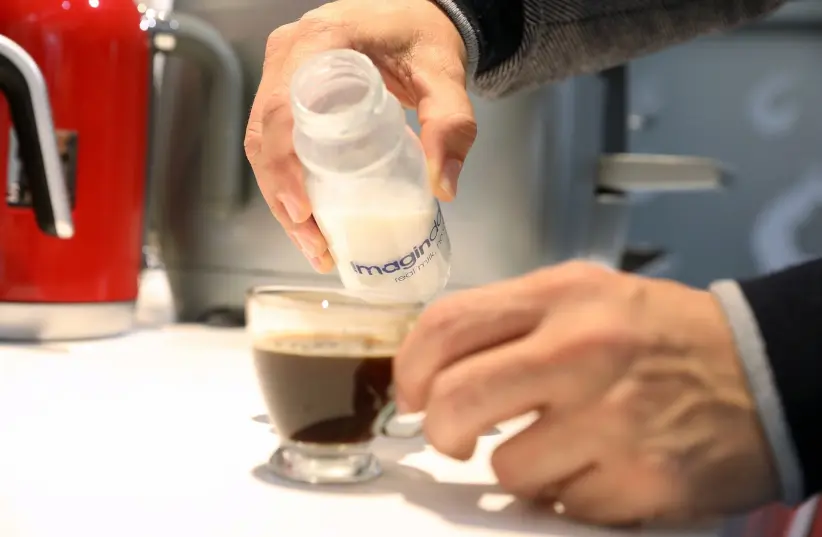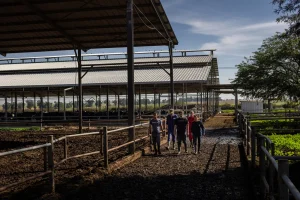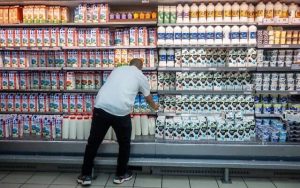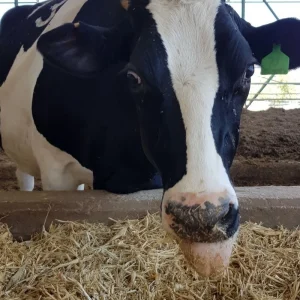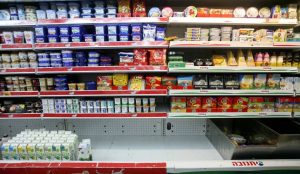
Last week saw the inaugural occurrence of Israel’s first global climate-tech conference, in the form of PLANETech World 2022. The event, hosted at Tel Aviv’s Rabin Center, drew in one and a half thousand attendees, investors and community members from the burgeoning climate-tech industry.
While the event’s 100 start-ups on display represented the vast array of climate technology — ranging from agriculture to hydrogen fuel to beekeeping management — a particular group of them caught my interest as I slipped through the event’s crowded show floors and busy halls: three different start-ups working on removing cows from the process of producing cow milk.
THIS TOWN AIN’T BIG ENOUGH FOR THE THREE OF US (OR IS IT?)
Those companies are Remilk, Imagindairy and Wilk — all of which are working toward the same goal, but each with their own unique approach. I noticed Remilk first, but was surprised to discover Wilk only about 12 steps away; once I noticed Imagindairy in the far corner of the same show floor, I felt a growing concern about the likelihood of getting caught in the splash zone of a dairy-alternative food fight.
However, as I spoke with each of the start-ups, I gradually understood that, at least for now, competition with each other is the last thing on the new-milk makers’ minds.
“I think there’s space for everybody. There are other technologies and there are other players with the same overarching theme of trying to address the future of food with their own tech, and even in the dairy space, and they’re all welcome.” Maayan Nave, Remilk
“I think there’s space for everybody. There are other technologies and there are other players with the same overarching theme of trying to address the future of food with their own tech, and even in the dairy space, and they’re all welcome,” said Maayan Nave, a Remilk representative at the conference.

“We need all the brains in the world, we need all the start-ups in the world to tackle issues like eco sustainability, climate care and supply chain; because lots of those issues are highly connected when you are talking about basic [staples] such as dairy,” said Nave.
Over at the Imagindairy booth, the sentiment was much the same. Lilach Zattelman, the company’s head of product development, explained to me that her company is happy to stay in its own lane and make a product that will do good in the world.
“There are so many issues of food security, and the demand for protein is growing dramatically in the world — the ability to grow good protein is something that the world will always need,” Zattelman said. “We have a solution for the production of good protein: it has both branched and non-essential amino acids, which are super important. [On a global scale,] That’s really, really important, so if there are more like us, it’s just good for everyone.”
Remilk and Imagindairy both utilize precision fermentation in their approach to milk recreation: a process of using “trained” yeast, bacteria and fungi to produce proteins that are identical to those found in standard cow milk. The combination of those proteins and each company’s secret recipe results in a protein-rich liquid which is, for most intents and purposes, indistinguishable from milk.
The last booth I visited belonged to Wilk, which uses a different production technique than its show floor neighbors: a process of cell extraction and replication to create a milk alternative that contains a one-to-one reproduction of the components found in milk from any mammal, including humans — something which sets them apart from anyone else in the space, according to the company’s CMO, Rachelle Neumann.
“It’s a different business model and value proposition: we are the only company in the world that’s actually producing both animal and human milk,” she said. “We are in the same ecosystem. But we are not immediate competitors.”
During my conversation with Remilk’s Nave, he alluded to the idea that others within the alt-milk space may not be developing with cost-efficiency in mind. When I asked Neumann about whether Wilk’s tech is too expensive to scale effectively, she was unruffled. “Of course, it’s going to be expensive, because it’s a new technology — no one has this technology in the world,” she said. “But eventually, any new technology in the world is going to come to a point where it’s going to be affordable and at the price point where everybody’s going to be able to participate in it.”
LAYING OUT THE BLACK AND WHITE CARPET
While it seems abundantly clear that these companies are competitors only in a technical sense for the time being, surely their attempts to replace cow-produced milk and subvert the modern dairy infrastructure would gain the ire of Big Dairy, right?
“On the contrary,” said Nave. “Traditional dairy industries are investing or buying products from us — we’re perfect partners. They wish to face their challenges with the supply chain and with consumer demand [for environmentally-conscious milk]. They’re reading the map the same way we are.”
In fact, each of these companies recognizes the importance of collaborating with the larger dairy industry— by promising a cleaner, more sustainable, less resource-intensive product that is of the same quality as they currently produce, the new-milk makers are opening themselves to the opportunity to piggy-back off of the critical infrastructure and reach of the traditional industry.
On that note, Zattelman expressed the lengths to which Imagindairy has gone to create a square peg for an old square hole. “Yeah, we all collaborate. We have Joint Development Agreements with several big dairy [companies], and we’ve worked together from the beginning of our development to fit our product to their specifications and requirements,” she said. “We’re working with their R&D teams and fine tuning our production process in order to fit their needs, without any adaptation of their [infrastructure].”
Neumann reinforced the mutual goals shared by the start-ups, Big Dairy and consumers alike: a more climate-conscious solution to milk, that’s still fundamentally milk at the end of the day.
“We don’t want to compete with dairy companies, nor do we want them to disappear. That’s not going to happen,” Neumann said. “What we think is that we definitely need to work together, startups and the industry in general, to bring something to the world that’s much better, and much more sustainable.”
